MercoPress. South Atlantic News Agency
Tag: Mercosur
-
Thursday, May 21st 2015 - 07:27 UTC
Uruguay and Brazil summit to consider a more flexible Mercosur
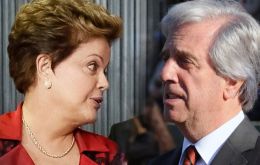
Uruguayan president Tabare Vazquez will be meeting his peer, Dilma Rousseff in Brasilia this Thursday to address a dense bilateral agenda, and more specifically the workings and future of Mercosur, in search for a more flexible group, open to agreements with third parties.
-
Friday, May 15th 2015 - 07:53 UTC
Uruguay convinced Mercosur will be more flexible regarding trade accords with third parties
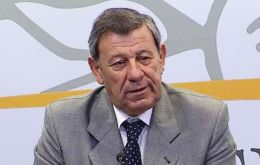
Mercosur countries have reached a basic consensus to look for mechanisms that will allow individual members to negotiate trade agreements outside the block, announced Uruguay's foreign minister Rodolfo Nin Novoa, who has been leading a strong campaign (with Brazilian support) on the issue.
-
Wednesday, May 13th 2015 - 08:05 UTC
Bolivia closer to Mercosur full membership; coming summit in Brasilia decisive
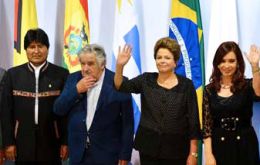
Bolivia is closer to becoming a full member of Mercosur following on Argentina's ratification of the Adhesion Protocol.
-
Monday, May 11th 2015 - 10:16 UTC
Vazquez and Rousseff meeting will address Mercosur/EU trade negotiations
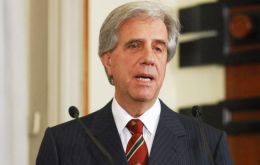
Uruguay and Brazil presidents, scheduled to hold a bilateral meeting next 21 May in Brasilia will be addressing Mercosur issues, and advancing in the proposal that will allow the group's members to sign bilateral agreements with third parties not belonging to the region, thus avoiding the 'consensus' clause clamp.
-
Thursday, May 7th 2015 - 06:55 UTC
Brazil wants to review Mercosur 'liberty' rules; sends strong public message to Argentina
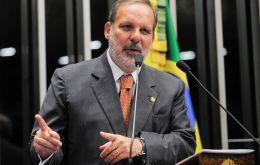
Brazil has proposed reviewing Mercosur rules so that its members can enjoy more 'liberty' to negotiate trade agreements with other blocks or third parties, because even when “Mercosur is an indissoluble marriage, this does mean that relations can't be discussed” and thus a 'different speeds' group should not be discarded.
-
Wednesday, May 6th 2015 - 07:04 UTC
Uruguay calls for an end to Mercosur 'hollow rhetoric' which undermines jobs
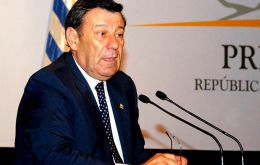
Uruguay's foreign minister Rodolfo Nin Novoa called on Mercosur to overcome “hollow rhetoric” and advance towards the elimination of barriers which restrict access to other markets and intra-region trade.
-
Tuesday, May 5th 2015 - 10:01 UTC
Mercosur prepared to consider the possibility of a 'two-speed' system with EU

Paraguay's foreign affairs minister Eladio Loizaga admitted in Madrid that Mercosur could consider the possibility of a “two-speed” system in trade and cooperation negotiations with the European Union. The minister was the main speaker at the event organized by Casa de America and the Spanish government news agency EFE.
-
Tuesday, May 5th 2015 - 09:52 UTC
Mercosur main partners' bilateral trade stalled for the last six years

Bilateral trade between Mercosur main partners Argentina and Brazil, has stalled at an annual 30bn dollars during the last six years (2008/2014), with no prospects of a recovery during 2015, according to Finsoport consultants from Buenos Aires.
-
Monday, May 4th 2015 - 06:30 UTC
Uruguay has the lowest corruption perception among Mercosur members
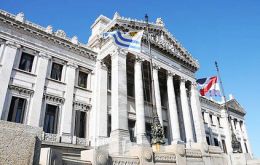
Uruguay enjoys the lowest perception of corruption among Mercosur countries and also a privileged position at global level, according to the country's Transparency and Public Ethics Commission. The ranking was based on data from Transparency International and World Bank for the period extending from 2003 to 2014.
-
Saturday, May 2nd 2015 - 07:34 UTC
Uruguay's meat exports in four months total 550m with beef the main item, 454m

Uruguay exported meat, offal, meat products and by-products worth 550 million dollars in the year up to 18 April, 8% more than the same period of 2014. Beef exports totaled 454 million in the first months of the year, with the main buyers including China, member countries of the North American Free Trade Agreement (NAFTA), the European Union, Israel and MERCOSUR countries.
